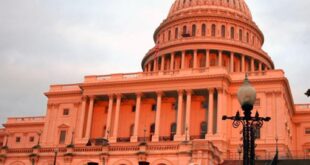 The recent international conference on Iraq held in Sharm el-Sheikh was the biggest and most inclusive diplomatic push to end that nation’s security crisis since the 2003 invasion that toppled Saddam Hussein. During an unannounced visit to Baghdad earlier this week, U.S. Vice President Dick Cheney says he pressed Iraqi leaders to make progress on pending security and political issues. Vice President Cheney is also visiting Saudi Arabia, Egypt, and Jordan to garner their support in helping to stabilize Iraq.
The recent international conference on Iraq held in Sharm el-Sheikh was the biggest and most inclusive diplomatic push to end that nation’s security crisis since the 2003 invasion that toppled Saddam Hussein. During an unannounced visit to Baghdad earlier this week, U.S. Vice President Dick Cheney says he pressed Iraqi leaders to make progress on pending security and political issues. Vice President Cheney is also visiting Saudi Arabia, Egypt, and Jordan to garner their support in helping to stabilize Iraq.
According to many analysts, the U.S.-Syrian meeting on the sidelines of the Sharm el-Sheikh conference was a long anticipated breakthrough. Syria’s Ambassador to Washington described Secretary Rice’s meeting with Foreign Minister Walid al-Moualem as “significant.â€Â Speaking with host Judith Latham of VOA News Now’s International Press Club, Nadia Bilbassy, senior diplomatic correspondent for Al-Arabiya television, says that’s the way the Arab World sees it, too. She says Secretary Rice told the Syrians that Washington wants Damascus to do more to seal its borders and stop foreign fighters from entering Iraq. Syria’s Ambassador to Washington later described the high-level meeting as a “tipping point†in U.S.- Syrian bilateral relations. Ms. Bilbassy says it seems to signal a “change in attitude … regarding the two pariah states†– Syria and Iran – that the United States had refused to talk to.
Gerard Baker, U.S. editor of The Times of London, says that people in Britain also see the meeting as a breakthrough, even though “they don’t expect anything much to come of it.â€Â Mr. Baker says the British are “pretty pessimistic†about Iraq. There is, however, a belief that Washington should talk with countries in the region, whatever it may think of their policies regarding Iraq.
Although no high-level meeting took place between Secretary Rice and her Iranian counterpart at Sharm el-Sheikh, her chief coordinator for Iraq and America’s Ambassador to Iraq did meet with Iran’s Deputy Foreign Minister for a few minutes. People in the Arab World see that as promising, according to Nadia Bilbassy, and there is an “understanding in the region that Iranian influence has to be halted.â€
Iranian journalist Ali-Reza Nourizadeh, who directs the Center for Arab-Iranian Studies in London, says he faults the Iranian Foreign Minster for using an entertainer’s red dress as a “pretext†to leave a diplomatic dinner early. And in that way, he could avoid speaking with the U.S. Secretary of States. But Mr. Nourizadeh says Iranians were not fooled because they had earlier seen President Ahmadinejad sitting with the Emir of Qatar, watching dances during opening ceremonies of the Asian Games in Doha. Unfortunately, he says Iran lost an important opportunity. Mr. Nourizadeh also says that not addressing the stabilization of Iraq makes no practical sense because Iran certainly does not want to see Iraq fall apart, which would in fact be a “nightmare†scenario for Tehran.
On the other hand, Nadia Bilbassy says Iraqi Prime Minister Nouri al-Maliki’s promise to accelerate political reforms, to reconcile ethnic groups, and to disband and disarm all militias was greeted with much “skepticism†in the Arab World. British journalist Gerard Baker says people in Britain do not find the Iraqi Prime Minister’s promise of reform and national reconciliation credible either. The view in Washington is that success in Iraq depends largely on the “political will†of the Prime Minister and it remains to be seen whether benchmarks for progress on the political front will be met.
 Eurasia Press & News
Eurasia Press & News



